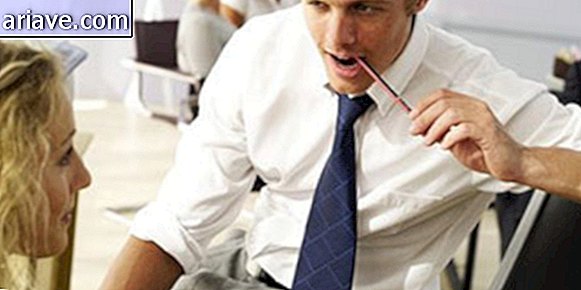Discover the risks of washing your hands with antibacterial soap
From an early age, we are taught to wash our hands before eating. “Don't you want to be sick? Wash your hands with antibacterial soap. ” In addition to parental incentives, in traditional commercials we always see a happy family in life “eliminating 99.9% of germs” with this kind of product. What if we tell you that this type of soap is actually very dangerous to health and good for nothing?
Probably every time you wash your hands using an antibacterial soap you should feel good as you are removing the bacteria and being healthier. But take a look at the packaging and you'll find that the product has triclosan - a chemical that can disrupt muscle function in humans.

Research published in the Proceedings of the National Academy of Sciences suggests that triclosan disrupts muscle contractions at the cellular level and inhibits the muscle function of fish and mice. Isaac Pessah, one of the researchers, gave an interview to Smithsonian magazine in which he reported:
“Triclosan is found practically in every home and environment. These findings provided strong evidence that the chemical is a serious problem for both human and environmental health. ”
The study investigated in the laboratory how triclosan affects the muscle cells of the human heart and skeleton. They found that the element interferes with the communication between proteins, which allow the muscles to function, thus resulting in failure of both cell types. To substantiate the theory, they experimented with mice and fish.
In rats, a 25% reduction in heart function was demonstrated, as well as an 18% decrease in grip strength. Other than that, after exposure to triclosan, the fish became less effective swimmers.
So what to do?
There is no denying that the chemical causes harm to muscle functions, and scientists are really concerned about the health risks it may pose. Nipavan Chiamvimonvat, another of the researchers, reported:
“The effects of triclosan on heart function were really drastic. Although the component is not regulated as a drug, it has acted as a potent tranquilizer in the heart of our test subjects. ”

Brought to court
It may sound alarming, but antibacterial soaps may be running out of days. Recently, the state of Minnesota, USA, has become the first place to ban triclosan-containing products. However, about 75% of liquid soaps have this element.
But does it help? Since triclosan-containing products were made available on the market - around the 1990s - the component has been included in different sectors, from liquid soaps and makeup to meat chopping boards and sheets.

Considering how prevalent the chemical is in everyday life, it is surprising how the FDA ( Food and Drug Administration) and Anvisa (National Health Surveillance Agency) regulators have never found evidence that soaps “ triclosan containing antibacterial agents had greater benefits over any other component not mixed with drugs.
Although the FDA published guidelines for the use of chemicals in liquid soaps in 1978, the agency never completed them - meaning that soap makers never had to follow mandatory federal rules on chemical additives. According to The Huffington Post, the rules that determine whether triclosan is still used in cleaning products could cause industries to lose $ 1 billion.
A suspicious component
Strangely enough, triclosan component licensing agencies have never proven that it has more user benefits than ordinary soap. According to a publication by the FDA itself:
“We have not received any evidence that triclosan provides any extra health benefits. So far, the agency has no evidence that the component applied in antibacterial soaps and wash products has an advantage over ordinary soaps and water. ”
But was triclosan the great villain?
If you have followed the story here, you should probably be throwing all the soaps, toothpaste, sheets, and meat boards in the trash, but calm down. In fact, triclosan is good for something: it helps fight gum disease. But unless you're washing your mouth with soap (or saying a lot of bad words), that doesn't mean it should be used everywhere.
In fact, antibacterial soaps are not bringing you any benefit; on the contrary, they are more likely to be harming you. In several animal studies, triclosan has been shown to cause endocrine disruption, ie the complex interaction of hormones that regulate most aspects of animal growth and reproduction.
When exposed to triclosan, male fish reduced sperm count, female mice had the puberty process affected, and male mice reduced the presence of thyroid hormones.
There is already some evidence about the side effects of the component in humans. A study in Norway showed that children with a high concentration of triclosan in their urine are more susceptible to seasonal allergies.

Last December, the FDA asked companies that make antibacterial soaps to prove - with real data - that their products “are safe, can be used daily and are more effective than traditional soap and water. In addition, they must prove that soaps prevent disease and prevent the spread of certain infections. ”
Although the FDA is not yet so alarmed by the component, it is obvious that they believe there is more to triclosan and similar chemicals than we know.
A global threat
When you use antibacterial soap you are not only doing harm to yourself but to the world. In addition to interfering with water waste, triclosan is also used in some types of pesticides. Therefore, the components found in it are sent to the rivers via sewage treatment waterways and the filtration process.
According to the US Environmental Protection Agency (EPA), the chemist can attach to suspended solids and settle in watercourses, which means that creatures at the top of the food chain can carry higher concentrations of the component. Something very dangerous when it hits the animals we catch and eat.
But it is not only animals that are harmed. Some studies have shown that plants grown in a triclosan-contaminated environment have already been able to dilute the compound and metabolize it, thus creating a new component. Scientists are still beginning to monitor the species we feed on to find out what the threats are.
To give you an idea, our antibacterial soap is playing a better role in destroying ocean life than it does with anything that lives on our skin. According to recent research, triclosan is 100 or even a thousand times more effective at “killing and killing algae, crustaceans and fish” than it is at eliminating microbes. Which is good news if you hate ocean animals.

More help for those who do not disturb
As if that wasn't enough, it gets worse. Covering everything we have with a light layer of triclosan could be the source of a new antibacterial-resistant superbug. Of course this is an inherent risk when any antibacterial compound is used without any control.
Bacteria will always find a way to resist a drug, no matter how it was made. Life always finds a way. The problem is, when a component is everywhere, just like triclosan seems to be. In such cases, resistance development occurs much faster.

And it doesn't end there. When a bacterium develops resistance against an element, that protection expands to similar ones. It is even possible to find some bacteria resistant to triclosan.
Therefore, scientists fear that families of Escherichia coli and Salmonel that are resistant to triclosan will also end up being resistant to other types of heavier antibacterial chemicals commonly used to combat more serious bacterial infections in hospitals.
Not yet the end of the world
So what to do? Simple, use the ordinary soap. The hard truth is that antibacterial soaps offer no benefit. And the companies that produce them have always known this. Stay tuned the next time you go to the market to buy toiletries and read the label carefully. It is very likely written that it "kills 99.9% of all common types of bacteria."
Not "all bacteria". Not "the most disgusting ones that can end your health." Just “the most common types of bacteria”. That is, the normal flora that is always present in our skin and that causes no problem. In fact, a good scrub of ordinary soap and a little water are enough to obliterate any types of germs you want to remove.
So the next time you get your hands dirty or your children get covered in dirt, you should still clean them, but leave the antibacterial soap in its place - in some market or drugstore, waiting for the FDA to take action. respect.












